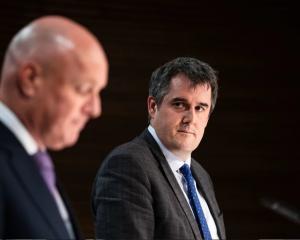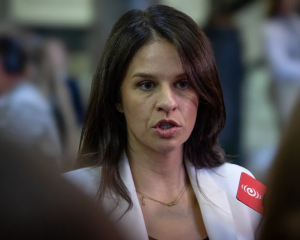Finance Minister Michael Cullen now believes the economy shrank in the first three months of the year, something he has previously avoided saying.
Dr Cullen has previously talked of worsening economic conditions and yesterday he put out a warning about any reckless election-year spending promises.
The National Party could find its election promises harder to fund if predictions are correct that New Zealand is in the middle of a recession and that things will only get worse.
National has been coy about its policies other than to say tax cuts were a priority.
Bank of New Zealand senior economist Craig Ebert said from Wellington yesterday the economy was showing signs of going from running large surpluses to running deficits, putting government spending at risk.
Dr Cullen told the finance select committee yesterday that economic data since the May budget was far gloomier than Treasury predicted.
"It is now quite clear that the quarterly GDP figure for the first quarter [of the 2008 year] almost seems inevitably to be negative," Dr Cullen said.
The GDP figures are due to be released on June 27.
Mr Ebert said the second GDP figures were looking as least as weak as those for the March quarter, which were forecast at -0.2% economic growth.
Two quarters of negative growth is a technical recession, but Mr Ebert said BNZ economists believed the economy would deteriorate beyond the point where it was "just a technical issue".
"We are looking at the signs of a more cyclical occurrence and the start of a process of slowdown."
Asked if the tax cuts announced in the May budget were affordable, Dr Cullen might get away with them, he said.
"The point is this is a warning shot for the Nat's that if they want to push any more through, we could spiral into bigger deficits. It will restrain them in what they can promise."
Six months ago, dairy money, tax cuts and government spending were seen as inflationary.
Now, they could not have come at a better time, Mr Ebert said.
Dr Cullen said the economy was facing "significant headwinds" because of drought, tight monetary policy, the housing downturn, credit crunch, food prices and oil prices.
The most significant change in these factors since the budget was the rise in oil prices, which was causing difficulties for households and businesses.
The Reserve Bank had recently come up with more pessimistic forecasts than those in the Budget.
Dr Cullen said the big difference between the two was that the bank had predicted far weaker housing and labour markets, adding, though, that the labour market appeared to be still holding up.
Mr Ebert said, this time, the economic slowdown had started in the consumer sector, with falls in retail and housing spending and property values, generally.
Usually, a slowdown started in the business sector, with businesses becoming more conservative, resulting in higher unemployment and cutbacks in consumer spending.
In the present scenario, once the slowdown hit the business sector, the cycle would feed back to consumers already feeling the pinch as jobless numbers increased.
"Goodness knows where we will end up when the labour market gets back to normal," he said.
National Party finance spokesman Bill English estimated the Reserve Bank's forecasts - if proven correct - could knock $1 billion off the Government's surplus.
Dr Cullen said there was little room for new expenditure or tax cuts, with much of the money set aside in future budgets likely to be soaked up by wage rises in the health and education sectors.











